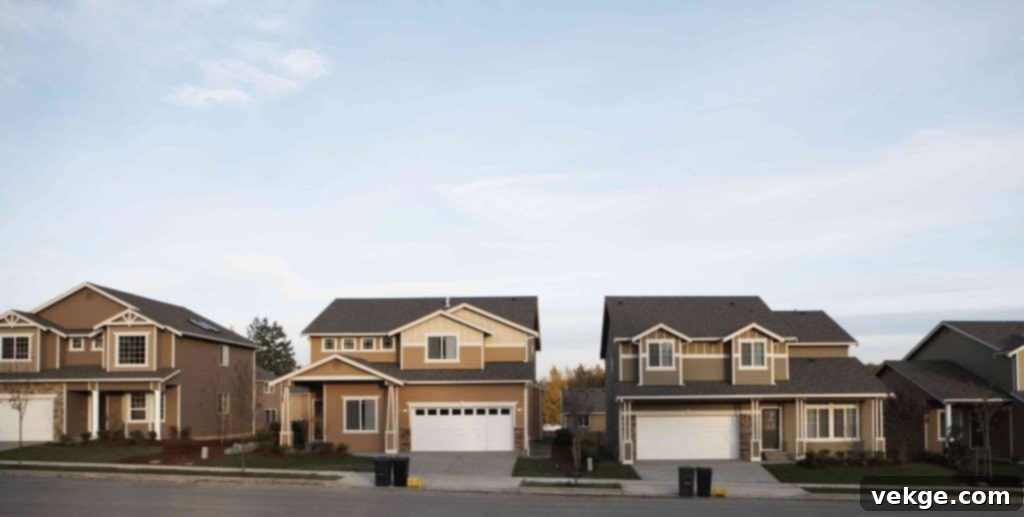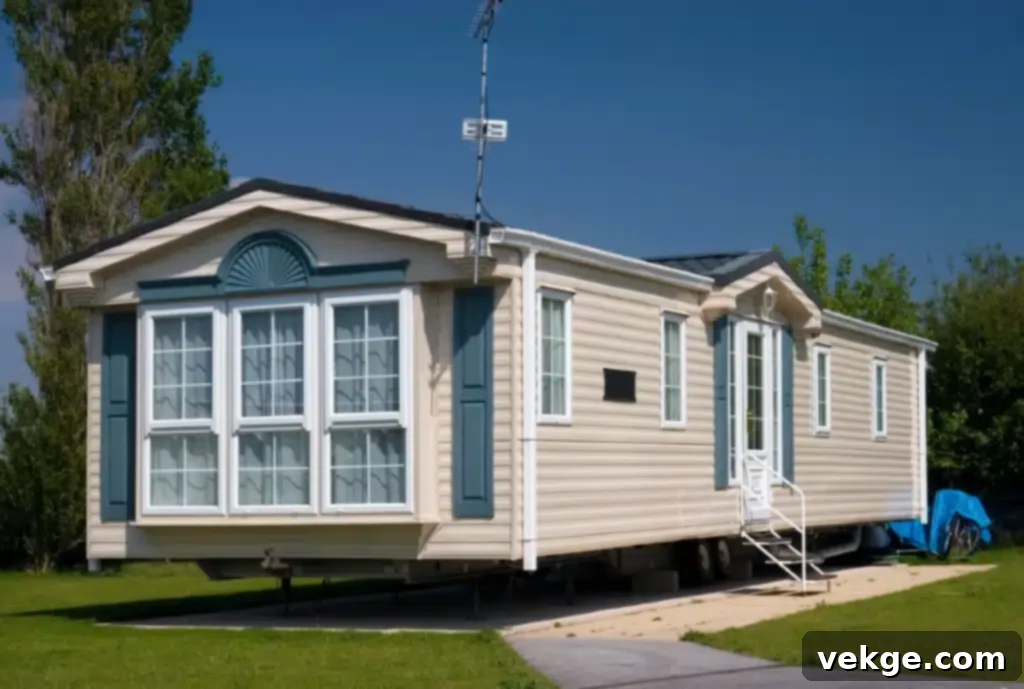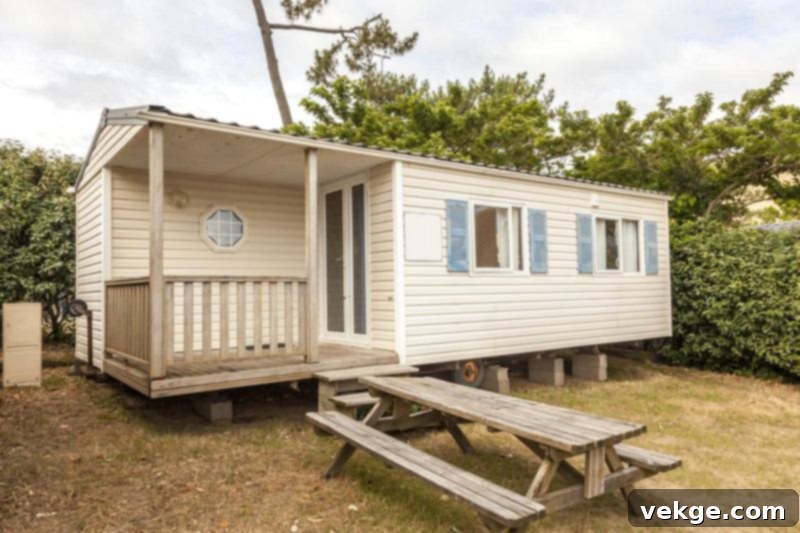Ultimate Guide: How to Sell Your Mobile Home Successfully and Maximize Your Profit
Selling a mobile home can be a rewarding endeavor, but it requires a well-thought-out plan and precise execution. With the right strategies, you can not only ensure a smooth transaction but also maximize your profit. This comprehensive guide will walk you through every essential step, from understanding critical property distinctions to accurately pricing your home and significantly enhancing its market value. By leveraging these expert tips, you can navigate the selling process with confidence and achieve your desired financial outcome.
Prepare to transform your mobile home selling journey into a successful and stress-free experience. Let’s delve into the detailed advice that will empower you to sell your mobile home like a seasoned professional.
Understanding the Difference between Personal and Real Property

One of the most fundamental aspects of selling a mobile home is distinguishing between personal property and real property. This distinction carries significant legal and financial implications for both the seller and the buyer. Personal property refers to movable items, such as vehicles, furniture, or appliances, which are not permanently affixed to land. In contrast, real property encompasses land and any permanent structures built upon it, typically including traditional stick-built homes.
Depending on its installation and legal classification, a mobile home can fall into either category. If your mobile home is still considered personal property, it’s often treated similarly to a vehicle, requiring registration with the Department of Motor Vehicles (DMV) and a title transfer. However, if it has been permanently affixed to a foundation and the title has been “retired” or “converted,” it becomes real property, subject to different regulations, financing options, and taxation. Grasping this crucial difference is paramount for ensuring you meet all legal requirements and choose the most advantageous selling path for your mobile home.
Documents Needed to Sell Your Mobile Home as Personal Property
When preparing to sell your mobile home as personal property, gathering all necessary documents well in advance is essential for a smooth transaction. The primary documents you’ll need include a meticulously prepared bill of sale, the official certificate of title, and any relevant warranties. The bill of sale is a critical legal document that formally transfers ownership from you to the buyer; it must clearly detail the purchase price, the full names and contact information of both the buyer and seller, and a precise description of the mobile home being sold.
Furthermore, you will require the certificate of title, typically issued by the DMV or a similar state agency, as definitive proof of your ownership. This document is equivalent to a car title and is essential for the legal transfer of ownership. It’s also wise to compile any manufacturer warranties, appliance warranties, or records of recent repairs, as these can add significant value and provide peace of mind to potential buyers. Always consult your state’s specific regulations for any additional required paperwork, such as lien releases if there was a previous loan. Proper documentation not only streamlines the sales process but also offers comprehensive legal protection and confidence for both parties involved.
Benefits of Converting to Real Property
Converting your mobile home to real property can significantly boost its perceived value and expand its marketability, making it a highly attractive option for many sellers. One of the most compelling benefits is that a reclassified mobile home typically qualifies for traditional real estate financing, such as conventional mortgages. This dramatically widens your pool of potential buyers, as it makes your home accessible to individuals who might not qualify for chattel loans or other specialized mobile home financing.
Moreover, real property often commands higher resale values due to its permanence and the stability it offers. Buyers are generally more inclined to invest in a property that they can treat as a long-term asset, capable of appreciating in value over time. Whether your mobile home is situated on private land you own or is part of a land-lease community (where the land beneath is leased, but the home itself is real property), the conversion provides a greater sense of security and investment potential. Considering this option can profoundly impact the success of selling your mobile home, offering a more robust and attractive proposition to a broader market.
Importance of Pre-listing Appraisal

Before you officially list your mobile home for sale, obtaining a professional pre-listing appraisal is an invaluable step. This objective assessment provides a realistic and unbiased valuation of your property, which is especially crucial for mobile homes due to the wide range of factors influencing their value, such as location (whether in a park or on private land), age, condition, and any upgrades. An accurate appraisal helps you set a competitive and fair price, positioning your mobile home favorably in the market and instilling greater confidence in potential buyers that they are making a sound investment.
Beyond just pricing, a pre-listing appraisal also serves as an early detection system. It can identify any underlying installation issues, structural concerns, or necessary repairs that might otherwise surface during a buyer’s inspection. Addressing these issues proactively can save you considerable time, money, and potential complications later in the sale process, preventing last-minute negotiations or even a deal falling through. This proactive approach ensures transparency and demonstrates your commitment to offering a well-maintained home, significantly increasing your chances of a swift and successful sale.
Identifying Installation and Inspection Issues Early
A thorough inspection prior to listing your mobile home is a non-negotiable step to ensure a smooth and successful sale. This proactive measure allows you to identify and address any potential installation or structural issues before they become obstacles. Common areas of concern in mobile homes often include the integrity of the plumbing and electrical systems, the condition of the roofing and siding, the stability of the foundation or skirting, and the efficiency of the HVAC unit. Additionally, look out for signs of water damage, insulation problems, or any issues related to the mobile home’s anchoring system.
Addressing these concerns early not only enhances your mobile home’s appeal to a wider range of buyers but also demonstrates your commitment to proper maintenance and reliability. Proactively fixing these issues can prevent last-minute buyer objections, costly repair negotiations, or delays during the appraisal and financing stages. By presenting a well-maintained and inspected home, you instill confidence in potential buyers, making them more likely to proceed with an offer and significantly increasing your chances of a quick and profitable sale.
Role of Home Inspection in Appraisal
The home inspection plays a pivotal role in the overall appraisal of your mobile home, as it provides a detailed assessment of the property’s condition, which directly influences its fair market value. During an inspection, a qualified professional meticulously examines all major components of the mobile home, including its structural integrity, mechanical systems, roof, and foundation. The findings from this inspection are then furnished to the appraiser, who uses this comprehensive report to form a more accurate and defensible valuation. Any identified deficiencies or necessary repairs highlighted in the inspection report can directly impact the appraiser’s assessment, potentially leading to a lower valuation if not addressed.
Conversely, a clean inspection report can reinforce the home’s value, reassuring both the appraiser and potential lenders. Furthermore, the inspection ensures that the mobile home meets all safety standards and regulatory requirements, which is often a prerequisite for certain types of financing. Collaborating closely with a knowledgeable real estate agent who understands the nuances of mobile home inspections and appraisals can further enhance this process, ensuring that any inspection-related matters are skillfully managed and communicated, thereby contributing to an accurate and favorable appraisal.
Choosing the Right Real Estate Agent

Selecting the ideal real estate agent is an absolutely critical step when embarking on the journey to sell your mobile home. This particular niche of the housing market demands specialized knowledge and experience that a general real estate agent might not possess. Therefore, it’s imperative to seek out an agent with a proven track record specifically in selling mobile and manufactured homes. Such an agent will have a deep understanding of the unique challenges, regulations, and market dynamics associated with these properties.
An experienced mobile home agent can effectively market your property to the right audience, accurately assess its value based on specialized comparables, and expertly navigate the intricacies of mobile home park rules, land leases, or conversion processes. Their specialized expertise will be instrumental in overcoming potential hurdles, optimizing your marketing strategy, and ultimately maximizing your home’s sale potential. The agent you choose can significantly influence the speed, efficiency, and profitability of your sale, making this decision one of the most impactful in your selling process.
Why Experience in Selling Mobile Homes Matters
Experience truly matters when you’re entrusting a real estate agent with the sale of your mobile home. As Lekhak Pravin wisely states, “Experiences Are Eternal!” This sentiment is particularly relevant in the specialized world of mobile home sales, where the complexities extend far beyond a typical stick-built property. An experienced agent will possess an in-depth understanding of the unique considerations, specific paperwork, and various legalities involved. They are adept at guiding you through the often-intricate process with expertise, keenly aware of the distinct requirements for mobile home sales, which can include navigating specific documentation like titles instead of deeds, understanding park regulations and lot leases, and handling the nuances of chattel loans or conversion to real property.
Moreover, agents experienced in this sector excel in developing tailored marketing strategies designed to effectively reach the precise demographic of potential mobile home buyers. Their deep knowledge of mobile home values, market trends, and specific community attributes ensures that your home is priced competitively and positioned for its maximum sale potential. By partnering with a proven, experienced agent, you gain invaluable peace of mind and confidence throughout the entire sales process, knowing that every detail is being handled by a professional who truly understands this unique market.
Role of a Local Agent in Selling Your Mobile Home
Partnering with a local real estate agent when selling your mobile home offers a multitude of advantages that can significantly streamline and optimize your selling experience. A local agent possesses invaluable, in-depth knowledge of the specific mobile home market in your area, including the intricacies of local mobile home parks, the availability and regulations of private land sales, and any specific municipal ordinances that might affect your transaction. This hyper-local expertise allows them to provide tailored advice that is perfectly suited to your property’s unique situation.
Local agents are also highly skilled at navigating the complex landscape of park regulations, homeowners association rules, and lot rent structures, which can often be confusing for out-of-area agents or unrepresented sellers. Their established network within the community means they can effectively attract and communicate with buyers who are specifically looking for mobile homes in your area, potentially expanding your listing’s visibility to a targeted audience. This local insight and network not only increases the likelihood of finding the right buyer quickly but also ensures that all aspects of the sale comply with local requirements, culminating in a more efficient and successful transaction.
Exploring Various Financing Options

Understanding and being able to offer a diverse range of financing options is a pivotal strategy when selling your mobile home, as it significantly broadens your appeal to a wider spectrum of potential buyers. Unlike traditional homes, mobile homes often involve specialized financing. Therefore, exploring and understanding options such as traditional lenders for real property conversions, government-backed FHA and VA loans, flexible owner financing, and specialized chattel loans is essential. Each of these options caters to different buyer profiles and financial situations.
You should carefully evaluate each financing option based on your selling timeline, risk tolerance, and the specific needs of your target buyers. By presenting a variety of viable financing pathways, you make your mobile home more accessible and appealing to a larger market segment. This flexibility not only increases the number of interested parties but also significantly boosts your chances of securing a buyer and achieving a successful sale. A knowledgeable real estate agent can assist you in highlighting these options to attract the best possible offers.
Understanding FHA Loans
FHA loans stand out as a highly popular and advantageous financing option for many mobile home buyers due to their flexible terms and government backing. Insured by the Federal Housing Administration, these loans are specifically designed to make homeownership more accessible, particularly for individuals with lower credit scores or limited funds for a down payment. For mobile homes to qualify for FHA financing, they typically need to be permanently affixed to a foundation and classified as real property, among other specific criteria like size and age requirements. Understanding these FHA requirements is key to attracting a substantial segment of potential buyers who rely on this type of government-insured financing.
The benefits of FHA loans are considerable and attractive to buyers: they often require a low down payment (as little as 3.5%), offer competitive interest rates, and feature more lenient credit score criteria compared to conventional loans. By highlighting your mobile home’s FHA eligibility, you effectively expand your buyer pool and significantly enhance your property’s marketability, making it a more viable option for a broader range of aspiring homeowners.
Benefits of VA Loans
For eligible veterans, active-duty military personnel, and their surviving spouses, VA loans offer exceptionally favorable terms for purchasing mobile homes, making them a powerful tool for sellers to attract a dedicated segment of the market. Backed by the Department of Veterans Affairs, VA loans are renowned for their incredible benefits, most notably requiring no down payment, which significantly reduces the upfront financial burden for qualified buyers. Furthermore, they typically offer highly competitive interest rates and eliminate the need for costly private mortgage insurance (PMI), which can save buyers thousands over the life of the loan.
Similar to FHA loans, for a mobile home to qualify for VA financing, it usually needs to be affixed to a permanent foundation and be considered real property. Actively promoting your mobile home’s eligibility for VA loans can be a strategic marketing advantage, drawing in potential buyers within this demographic. By highlighting the substantial advantages such as zero down payment, lower monthly costs, and favorable interest rates, you significantly increase the appeal of your property and the likelihood of securing a swift and successful sale to a deserving veteran or service member.
Pricing Your Mobile Home Right

Accurately pricing your mobile home is arguably the most critical factor in attracting serious buyers and ultimately maximizing its sale potential. This delicate balance requires a comprehensive understanding of various market dynamics. To arrive at the optimal price, you must carefully consider current market trends, the demographics of your target buyers, recent comparable sales in your area, and the specific condition and features of your mobile home. A price that is competitive and aligned with current market conditions will generate significantly more interest and lead to quicker offers.
Conversely, overpricing your mobile home can be detrimental; it often deters potential buyers from even viewing your property, causing it to languish on the market and potentially requiring multiple price reductions. Such delays can also signal to buyers that there might be underlying issues with the property. To strategically price your home for a successful sale, meticulously analyze available market data, consult with an experienced real estate agent who specializes in mobile homes for a comparative market analysis (CMA), and always keep buyer preferences and expectations in mind. Setting the right price from the outset is a powerful strategy to ensure a swift and profitable transaction.
Market Trends and Buyer Demographics Impact on Pricing
Market trends and buyer demographics are indispensable factors that play a pivotal role in effectively pricing your mobile home. Staying thoroughly informed about current market conditions—such as the balance of supply and demand, prevailing interest rates, and the average time homes spend on the market—can provide crucial insights into how to price your home competitively. For instance, in a seller’s market with high demand and low inventory, you might be able to price your home slightly higher, whereas in a buyer’s market, a more aggressive, competitive price will be necessary to stand out.
Additionally, understanding the specific buyer demographics in your area can offer invaluable insights into their preferences, needs, and realistic price ranges. For example, if your mobile home is located within a vibrant retirement community, potential buyers may prioritize affordability, low-maintenance features, accessibility modifications, and proximity to amenities. On the other hand, if your home is in a family-oriented area, buyers might value larger living spaces, good schools, and community amenities suitable for children. By meticulously aligning your pricing strategy with prevailing market trends and the specific characteristics of your target buyer demographics, you significantly increase your chances of attracting genuinely interested buyers who are not only willing but also able to pay the right price for your mobile home, leading to a much faster and more satisfactory sale.
Strategies for Competitive Pricing
When embarking on the crucial task of pricing your mobile home, employing several strategic approaches can help you achieve a competitive and attractive asking price. Firstly, consider offering enticing incentives, such as covering a portion of the closing costs, providing a home warranty, or even exploring the possibility of seller financing. These gestures can significantly broaden your home’s appeal and motivate more buyer interest, especially in a competitive market. Secondly, meticulously highlight the unique features, recent upgrades, and any distinct advantages of your mobile home. This could include energy-efficient windows, new appliances, custom cabinetry, or a beautifully landscaped yard, which can justify a higher asking price and effectively differentiate your property from other listings.
Furthermore, a powerful strategy involves pricing your mobile home slightly below what you perceive as market value. This tactic can generate increased interest, potentially leading to a flurry of showings and even multiple offers, which can ultimately drive the price up to or above your initial target. It’s also vital to regularly review and adjust your pricing strategy based on market feedback, the number of inquiries, and buyer engagement levels. Utilize online tools and resources, such as real estate portals and local market reports, to gather valuable insights into current pricing trends and recently sold comparables in your specific area. By adopting these competitive pricing strategies, you empower yourself to set the most advantageous price for your mobile home, paving the way for a successful and profitable sale.
Enhancing the Value of Your Mobile Home

Significantly enhancing the value of your mobile home is a proactive approach that can dramatically boost its appeal to a broader spectrum of buyers and justify a higher asking price. Strategic upgrades, even minor ones, can profoundly elevate the perceived value of your property. Simple yet impactful improvements such as installing energy-efficient windows, upgrading to modern appliances, or even a fresh coat of neutral paint can make a substantial difference. These investments not only modernize the home but also promise future savings for the buyer, making the property more attractive.
Beyond interior enhancements, the presentation of your mobile home is equally vital. Professional home staging creates a warm, inviting, and spacious atmosphere, allowing potential buyers to easily envision themselves living in the space. Concurrently, meticulous landscaping transforms your home’s exterior, significantly enhancing its curb appeal and making a powerful, positive first impression. These combined efforts—thoughtful upgrades, effective staging, and attractive landscaping—are highly effective strategies to maximize your mobile home’s market value and ensure it stands out in a competitive market, leading to a faster and more profitable sale.
Features that Increase the Value of Your Mobile Home
Investing in certain features and upgrades can significantly increase the perceived and actual value of your mobile home, making it more competitive and desirable. Key improvements often include installing energy-efficient windows, which not only enhance aesthetics but also promise long-term utility savings for buyers. Upgrading to modern, stainless-steel appliances in the kitchen can instantly modernize the space and add a touch of luxury. Additionally, a fresh coat of neutral-colored paint throughout the interior and a power wash of the exterior can create a clean, inviting ambiance that appeals to a wide range of tastes.
Beyond these, consider updating flooring to durable and attractive options like laminate or vinyl plank, refreshing bathroom fixtures, or even adding built-in storage solutions to maximize space. If feasible and compliant with local regulations, increasing the usable square footage through well-planned additions or enclosed porches can substantially boost the perceived value. These strategic enhancements not only justify a higher asking price but also significantly increase your chances of selling your mobile home at or above your desired price, as they demonstrate care, modern living, and long-term value to prospective buyers.
Importance of Home Staging and Landscaping
Home staging and landscaping are not merely aesthetic touches but crucial elements that can profoundly impact the successful sale of your mobile home. Effective home staging involves thoughtfully arranging furniture, decluttering personal items, and creating a neutral, welcoming atmosphere that allows potential buyers to envision themselves living comfortably in the space. It helps highlight the home’s best features, maximize perceived space, and create an emotional connection with visitors, making your property memorable and desirable.
Equally important is meticulous landscaping, which focuses on enhancing your mobile home’s curb appeal—the first impression buyers get before even stepping inside. A well-maintained lawn, neatly trimmed bushes, vibrant flowers, and a clean, inviting pathway signal that the home has been well-cared for. Together, staging and landscaping work in tandem to increase the overall property value, attract more interested buyers, and ultimately expedite the sales process. These relatively small investments can lead to a significantly higher selling price and a much quicker close, proving that presentation is key to capturing buyer interest in a competitive market.
Conclusion
Selling a mobile home successfully is a multifaceted process that genuinely demands careful planning, strategic execution, and meticulous attention to detail at every stage. A fundamental understanding of the distinction between personal and real property is paramount, as it dictates the required documentation, legal procedures, and available financing options. Obtaining a pre-listing appraisal is a proactive step that allows you to accurately price your home and address any potential issues early on, preventing future complications.
Choosing an experienced real estate agent who specializes in mobile homes is invaluable; their niche expertise will guide you through complex market dynamics and specific regulations. Furthermore, exploring and understanding various financing options, such as FHA and VA loans, significantly broadens your buyer pool and makes your home more accessible. Strategically pricing your mobile home based on market trends and buyer demographics is critical for attracting serious offers, while enhancing its value through smart features, professional staging, and attractive landscaping will elevate its appeal and justify a premium price. By diligently following these expert strategies and preparing for common challenges, you are well-equipped to achieve a successful and profitable sale, confidently reaching your financial and residential goals.
